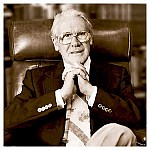 It hits everyone at some time in their life. The big question. Why am I here? What is the purpose of my existence? I for one refused to let go of the question until I got an answer.
It hits everyone at some time in their life. The big question. Why am I here? What is the purpose of my existence? I for one refused to let go of the question until I got an answer.After observing the seeming futility of human existence in the face of war and hatred and famine and disease, I became fiercely unwilling to acquiesce to the “just go along with it and don’t ask questions” mentality of the world. I was not created a lemming and I would not live my life as if I had been, fated to tumble off some unseen abyss into a nevernever land of meaninglessness. If there was no transcendent meaning to life, I did not want to live it. To do so would make life a sad joke played by a ridiculous excuse for a God. On the other hand, if God did exist, I was going to get an answer from Him on this most important question and, hopefully, fulfill what it was He created me to do.
Last newsletter, we dealt with the fundamental question of why evil exists. Now we want to examine what, in the face of evil, we are meant to do with our lives here on earth.
After all, if there is a God with infinite wisdom, then He must necessarily imbue everything He does with meaning and significance. For a God who is all-wise to do any less would be a logical impossibility. Everything He creates will necessarily be a reflection of the total wisdom and knowledge He possesses, and therefore, all that God creates must brim with meaning, significance and purpose - from the pesky gnat to the pinnacle of creation itself - man.
What then is the reason man was created? What is our purpose and what meaning and significance does our existence bring to the rest of reality?
In Jeremiah 29:11-14, God says: “’For I know the plans that I have for you,’ declares the Lord, ‘plans for welfare and not for calamity to give you a future and a hope. Then you will call upon Me and come and pray to Me, and I will listen to you. And you will seek Me and find {Me,} when you search for Me with all your heart. And I will be found by you,’ declares the Lord . . . “
God says He has plans for us, He has a future for us. There is purpose and meaning in our existence. And, it seems, part of the playing out of that purpose is a sincere and persistent search for the God who created us. In fact, the clear implication of that scripture is that without seeking and finding God, we cannot know our purpose. It is from God Himself that we learn what our purpose in life is. That presupposes communication between God and man. We know from other scriptures that communication between God and man can only be made possible by man being reconciled to the God he has forsaken through his sin. That reconciliation is what Jesus provided for anyone who would come after Him. This is what John 3:14-21 is all about - the rebirth of our spirit - our point of contact with God Himself (see John 4:24).
Scripture tells us in Prov. 16:4, “The Lord has made everything for its own purpose”, and in Is. 5:19, “let the purpose of the Holy One of Israel draw near And come to pass, that we may know {it!}”
In Is. 46:10 God says, “My purpose will be established, And I will accomplish all My good pleasure.” In Luke 7:30 it says of the Pharisees and the lawyers that they “rejected God’s purpose for themselves.” In Acts 13:36 it says that King David “served the purpose of God in his own generation.”
So that no one think that God has a purpose only for certain specially talented people, Rom. 8:28 tells us, “we know that God causes all things to work together for good to those who love God, to those who are called according to {His} purpose.”
Our job is to love God and to respond to His leading. God’s job is to plan and pave the way for us to step into the purpose that He has for each and every one of us - a purpose that is uniquely tailored to our individual talents and personalities. Phil. 2:13 says, “for it is God who is at work in you, both to will and to work for {His} good pleasure.”
It is in developing an intimate, loving relationship with God that we enter into our purpose in life. And it is in seeking His direction that we discover the reason for which He has called us into the world. Eph. 2:10 confirms the fact that, “we are (God’s) workmanship, created in Christ Jesus for good works, which God prepared beforehand, that we should walk in them.”
Our purpose goes far deeper, however, than mere good works. That is what the Pharisees in Jesus’ day failed to understand. Our purpose, fundamentally and foremost, is to be conformed to the image of Christ as a witness to His glory in the world. The Apostle Paul clearly indicated in Gal 4:19 that Christ is in some sense being formed in believers - “My children, with whom I am again in labor until Christ is formed in you.” And in 1 Cor. 2:16 Paul says, “we have the mind of Christ.”
In a very real sense, we take on and reflect the glory of God just as Moses did when he came down from the mountain with his face all aglow after being in the presence of God. We reflect God’s glory as a result of the same cause - by being in the presence of God. 2 Cor. 3:18 says it clearly - “But we all, with unveiled face beholding as in a mirror the glory of the Lord, are being transformed into the same image from glory to glory, just as from the Lord, the Spirit.” The more time we spend in God’s presence, the more we reflect His image and glory and the more completely we fulfill the purpose for our lives.
Jesus expanded on this theme by indicating that we are to bring glory to God the Father through our loving obedience to His guidance and direction. Jesus said in John 15:8, “By this is My Father glorified, that you bear much fruit, and {so} prove to be My disciples.” “Fruit” in this context, is that which is produced solely under the guidance and empowerment of the Lord. It is much more that mere good deeds. It is the outworking of God’s will through our obedient actions. As it says in Tim. 1:9: “(God) who has saved us, called us with a holy calling, not according to our works, but according to His own purpose and grace which was granted us in Christ Jesus from all eternity.”
2 Cor. 5:4-5 indicates that God prepared us “in order that what is mortal may be swallowed up by life. He who prepared us for this very purpose is God.” Similarly, 1 Thess. 4:7 says, “For God has not called us for the purpose of impurity, but in sanctification.”
Another part of our purpose can be seen in 1 Pet. 2:21, which says, “you have been called for this purpose, (suffering as a result of believing in Christ), since Christ also suffered for you, leaving you an example for you to follow in His steps.”
In 1 Pet. 3:9 the idea is further defined. “Not returning evil for evil, or insult for insult, but giving a blessing instead; for you were called for the very purpose that you might inherit a blessing.” 1 Pet. 4:1 finishes this line of thought with, “Therefore, since Christ has suffered in the flesh, arm yourselves also with the same purpose, because he who has suffered in the flesh has ceased from sin.” This is the suffering of doing good instead of evil, of following Christ instead of our own hearts and minds. Certainly a part of our purpose on this earth is as a witness and an example of the importance of these truths.
The purpose of life is not, as our world so blindly assumes, to simply have a career and a family and die in peace over a job well done. Prov 16:9 says instead, “The mind of man plans his way, But the Lord directs his steps.” We are, in fact, to submit our will and plans to the Father and receive our direction from Him, just as Jesus did.
You want to know the purpose of your life? Do as the writer to the Hebrews suggested in Chapter 12, verse 2, - fix your eyes on Jesus, the author and perfecter of faith, and discover the ultimate reason for your existence:
“And this is eternal life, that they may know Thee, the only true God, and Jesus Christ whom Thou hast sent.” (John 17:3)
The ultimate purpose of life is to enter into an intimate relationship with the God who created and redeemed us, and to learn to trust and obey Him.
And so as Paul did in Eph. 1:18-21:
“{I pray that} the eyes of your heart may be enlightened, so that you may know what is the hope of His calling, what are the riches of the glory of His inheritance in the saints and what is the surpassing greatness of His power toward us who believe. {These are} in accordance with the working of the strength of His might which He brought about in Christ, when He raised Him from the dead, and seated Him at His right hand in the heavenly {places}, far above all rule and authority and power and dominion, and every name that is named, not only in this age, but also in the one to come.”
------------------------------------------------------------------------
------------------------------------------------------------------------
Copyright © 1996, 1997 Mastering Life Ministries
This article is reprinted by permission of the publisher.











